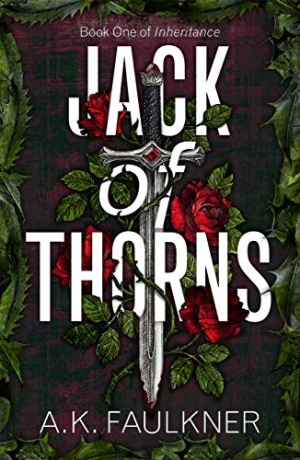Jack of Thorns
- 2019 INDIES Winner
- Silver, Fantasy (Adult Fiction)
As potent and enchanting as a flower, Jack of Thorns is a seductive novel that weaves together elements of romance, pagan spirituality, family trauma, and magic.
A man learns that with great power comes even bigger problems in A. K. Faulkner’s sexy, magical romance Jack of Thorns.
Nothing about Laurence is ordinary. He is a man of extremes, from his problematic substance use to his overpowering sex drive. His addictive personality comes with ugly consequences, including a near-fatal overdose and a manipulative ex-boyfriend who refuses to move on.
Laurence lives over his mother’s flower shop, smokes his own homegrown weed, and is frequently on the prowl. However, Laurence learns that the qualities that he tries to tamp down are blessings in disguise. As he leans into his pagan spiritual practice, he connects with a wild, chaotic god who teaches him to use his powers. As he discovers his true potential, Laurence must also contend with otherworldly forces, both within and beyond himself.
Laurence’s exploration of his divine side also summons Quentin, Earl of Banbury, who struggles to control his telekinetic powers, too. The two men are undeniably drawn to one another, and the novel sustains delicious tension as Laurence and Quentin navigate their differences.
From its first page, Jack of Thorns is compelling and dramatic. Its quick pacing and short chapters alternate between Laurence’s and Quentin’s perspective, and they describe a realistic, contemporary San Diego, down to the color of the hacienda tiles.
Quentin’s voice is distinct, with upper-class turns of phrase that are both funny and endearing. His persistent use of the singular “one” and funny observations about American culture are pithy without being acerbic. He struggles with a difficult family history that triggers episodes of telekinetic power. He’s a terrific foil for Laurence, whose messiness is irresistible. Strategic flashbacks establish each character’s motives, fears, and deepest desires, while zingy dialogue supports the plot development.
Secondary characters, including Laurence’s stalker ex Dan and his mother Miriam, are well drawn and complex. The novel includes some disturbing scenes of sexual assault, gaslighting, and manipulation, but these encounters are not gratuitous. Characters talk openly about domestic and emotional abuse, addiction, and coping with bi-erasure.
Most of all, the novel is packed with top notch writing. The story’s details are immediate and use all the senses to bring the book to life. Waking from a hangover, Laurence’s “tongue felt like the bottom of a birdcage.” Elsewhere, one-line meditations on the significance of spirituality, family history, and love elevate this supernatural romance. This isn’t just a love story: as a novel, it touches on the deeper themes of being human. It observes that time is “the ultimate apex predator, shaping all landscapes and yet consuming all who lived within them.”
Jack of Thorns is a seductive novel that weaves together elements of romance, pagan spirituality, family trauma, and magic. It’s as potent and enchanting as a flower from Laurence’s greenhouse: aromatic and beautiful, with tender thorns.
Reviewed by
Claire Foster
Disclosure: This article is not an endorsement, but a review. The publisher of this book provided free copies of the book and paid a small fee to have their book reviewed by a professional reviewer. Foreword Reviews and Clarion Reviews make no guarantee that the publisher will receive a positive review. Foreword Magazine, Inc. is disclosing this in accordance with the Federal Trade Commission’s 16 CFR, Part 255.

